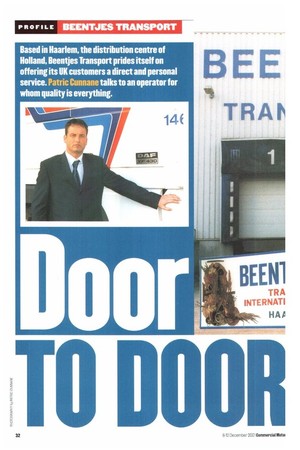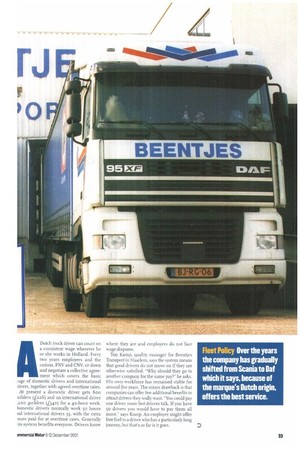00 11' 0 0 11 A Dutch truck driver can count on a consistent
Page 32

Page 33

Page 34

If you've noticed an error in this article please click here to report it so we can fix it.
wage wherever he or she works in Holland. Every two years employers and the unions, FNV and CNV, sit down and negotiate a collective agreement which covers the basic iage of domestic drivers and international rivers, together with agreed overtime rates.
At present a domestic driver gets Soo uilders (1'22.6) and an international driver .200 guilders 04o) for a 40-hour week. )omestic drivers normally work 5o hours nd international drivers 55, with the extra ours paid for at overtime rates. Generally us system benefits everyone. Drivers know where they are and employers do not face wage disputes.
Ton Kamp, quality manager for Beentjes Transport in Haarlem, says the system means that good drivers do not move on if they are otherwise satisfied, "Why should they go to another company for the same pay?" he asks. His own workforce has remained stable for around five years. The minor drawback is that companies can offer few additional benefits to attract drivers they really want. You could pay one driver more but drivers talk. If you have 50 drivers you would have to pay them all more," says Kamp. An employer might offer free fuel to a driver who has a particularly long journey, but that's as far is it goes.
Full loads
Beentjes needs to able to place a lot of confidence in its drivers, since it runs up to 40 trucks a week into England, delivering direct to clients rather than placing the goods in the hands of agents. Up to 8o% of its work is groupage, the rest full loads.
It has a partnership with Molloy Transport of Sale which supplies it with return loads for Dutch customers. Beentjes' trucks are a common sight on UK motorways as they carry out multi-drop work all over England as far north as Newcastle and west into Wales. Drivers keep in touch by cab phone but this is likely to be upgraded to a satellite-based system before long.
Kamp says it is unusual for an international operator to deliver directly to customers but suggests the arrangement is more satisfying for all concerned: It cuts out damage and means we have r00% control. If a client calls we can contact the driver and tell the client exactly when his goods will be delivered."
Return loads
The link with Molloy Transport and arrangements with other Dutch customers means that trucks mostly return full: "Around 90% of our return loads are our own customers," says Kamp. This means the company does not have to waste time phoning around for backloads among UK hauliers.
Typically a Beentjes driver will leave for the UK on Sunday evening from Rotterdam or Hook of Holland with deliveries beginning on Monday morning. By Tuesday evening they are back in Felixstowe with an empty trailer to drop. At this point, they collect an unaccompanied trailer which has arrived from Holland and are ready to carry out more UK deliveries. They return to Holland on Saturday morning.
CM is meeting Kamp in what he says is the busiest time of the year, the autumn. By early December things will have quietened down. The company's domestic deliveries slow in the run-up to 5 December, the day the Dutch celebrate the arrival of Santa Claus, Two weeks before Christmas, it gets busy again, but once Christmas arrives, most companies are closed for two weeks."
Fuel costs
Some problems, it seems, are universal. In Holland, the cost of fuel rose so rapidly last year that the government introduced rebates for hauliers as increases of 20% became common. Those rebates are due to end this year. Kainp says that it is common for hauliers close to Germany and Belgium to buy their fuel across the border because it is cheaper.
The best-value fuel in Europe seems to be found in Luxembourg, where it costs less than one guilder (28p) a litre. If Kamp has a truck going to France he will instruct the driver to refuel in Luxembourg. Whatever happens, drivers are instructed not to buy fuel in the UK, which is much more expensive than Holland: "Most of our trucks have extra big fuel tanks—some can carry i,000 litres." At present, fuel in Holland costs about 1.5 guilders (42p) a litre.
Fifty years on from its foundation, Beentjes Transport runs a fleet of Go trucks and pro vides work for 40 subcontractors a day. The operation includes its sizeable domestic oper ation with its depots at Haarlem ("the distrib ution centre of Holland", according to Kamp and Egrnond, in northern Holland.
Growth has been through acquisitior because, in the early days, it was the easies way to get extra licences. "The only way te grow was to buy another company-2o extr: trucks gave you 20 extra licences," says Kamp
The company's UK business covers a myr iad of products including computers, pet foot and flowers. Above all, Kamp's responsibilit! is to ensure that goods arrive in good condi tion: "I look after the quality of the job. The main problem comes if the goods are dam aged. The client has given them to us to ge from A to B. If they are damaged, he has te explain to his customer and send more goods Time is not such a problem. We will phone ; client if bad weather delays the ferry. The won't complain if they are notified. But it bad when a client has to phone—you mus phone first otherwise they get dissatisfied."
























































































































































